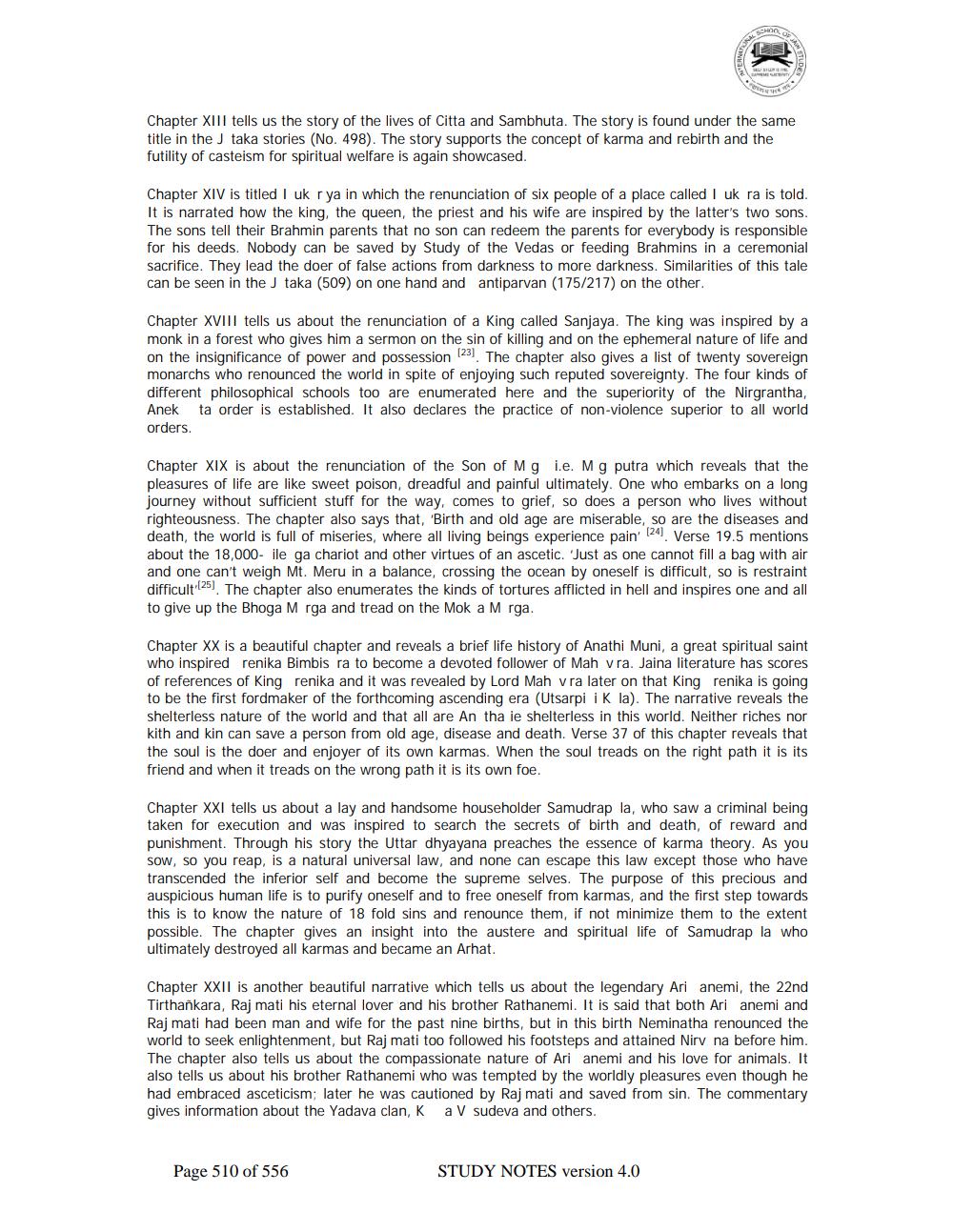________________
Chapter XIII tells us the story of the lives of Citta and Sambhuta. The story is found under the same title in the J taka stories (No. 498). The story supports the concept of karma and rebirth and the futility of casteism for spiritual welfare is again showcased.
Chapter XIV is titled I uk rya in which the renunciation of six people of a place called I uk ra is told. It is narrated how the king, the queen, the priest and his wife are inspired by the latter's two sons. The sons tell their Brahmin parents that no son can redeem the parents for everybody is responsible for his deeds. Nobody can be saved by Study of the Vedas or feeding Brahmins in a ceremonial sacrifice. They lead the doer of false actions from darkness to more darkness. Similarities of this tale can be seen in the J taka (509) on one hand and antiparvan (175/217) on the other.
Chapter XVIII tells us about the renunciation of a king called Sanjaya. The king was inspired by a monk in a forest who gives him a sermon on the sin of killing and on the ephemeral nature of life and on the insignificance of power and possession 23. The chapter also gives a list of twenty sovereign monarchs who renounced the world in spite of enjoying such reputed sovereignty. The four kinds of different philosophical schools too are enumerated here and the superiority of the Nirgrantha, Anek ta order is established. It also declares the practice of non-violence superior to all world orders.
Chapter XIX is about the renunciation of the Son of Mg i.e. Mg putra which reveals that the pleasures of life are like sweet poison, dreadful and painful ultimately. One who embarks on a long journey without sufficient stuff for the way, comes to grief, so does a person who lives without righteousness. The chapter also says that, 'Birth and old age are miserable, so are the diseases and death, the world is full of miseries, where all living beings experience pain 24. Verse 19.5 mentions about the 18,000- ile ga chariot and other virtues of an ascetic. Just as one cannot fill a bag with air and one can't weigh Mt. Meru in a balance, crossing the ocean by oneself is difficult, so is restraint difficult 125. The chapter also enumerates the kinds of tortures afflicted in hell and inspires one and all to give up the Bhoga M rga and tread on the Mok a Mrga.
Chapter XX is a beautiful chapter and reveals a brief life history of Anathi Muni, a great spiritual saint who inspired renika Bimbis ra to become a devoted follower of Mah vra. Jaina literature has scores of references of King renika and it was revealed by Lord Mah vra later on that King renika is going to be the first fordmaker of the forthcoming ascending era (Utsarpi i K la). The narrative reveals the shelterless nature of the world and that all are An tha ie shelterless in this world. Neither riches nor kith and kin can save a person from old age, disease and death. Verse 37 of this chapter reveals that the soul is the doer and enjoyer of its own karmas. When the soul treads on the right path it is its friend and when it treads on the wrong path it is its own foe.
Chapter XXI tells us about a lay and handsome householder Samudrap la, who saw a criminal being taken for execution and was inspired to search the secrets of birth and death, of reward and punishment. Through his story the Uttar dhyayana preaches the essence of karma theory. As you Sow, so you reap, is a natural universal law, and none can escape this law except those who have transcended the inferior self and become the supreme selves. The purpose of this precious and auspicious human life is to purify oneself and to free oneself from karmas, and the first step towards this is to know the nature of 18 fold sins and renounce them, if not minimize them to the extent possible. The chapter gives an insight into the austere and spiritual life of Samudrap la who ultimately destroyed all karmas and became an Arhat.
Chapter XXII is another beautiful narrative which tells us about the legendary Ari anemi, the 22nd Tirthankara, Raj mati his eternal lover and his brother Rathanemi. It is said that both Ari anemi and Raj mati had been man and wife for the past nine births, but in this birth Neminatha renounced the world to seek enlightenment, but Raj mati too followed his footsteps and attained Nirv na before him. The chapter also tells us about the compassionate nature of Ari anemi and his love for animals. It also tells us about his brother Rathanemi who was tempted by the worldly pleasures even though he had embraced asceticism; later he was cautioned by Raj mati and saved from sin. The commentary gives information about the Yadava clan, K a V sudeva and others.
Page 510 of 556
STUDY NOTES version 4.0




